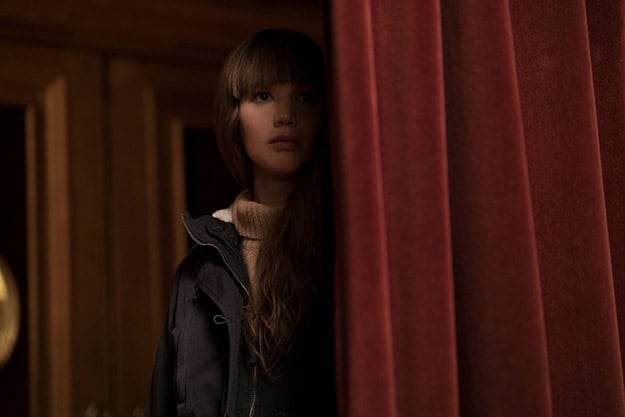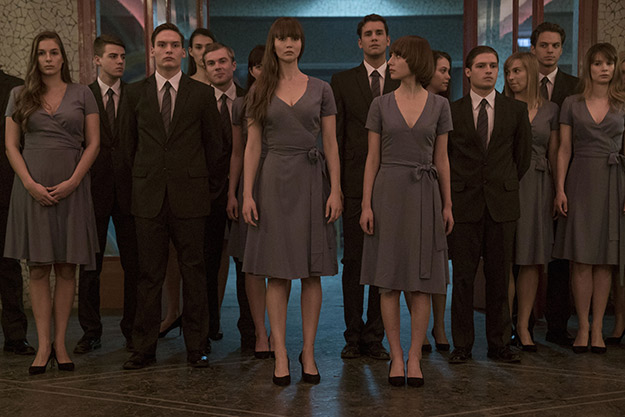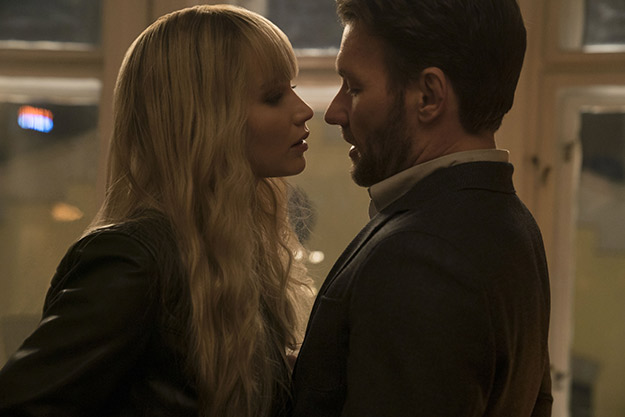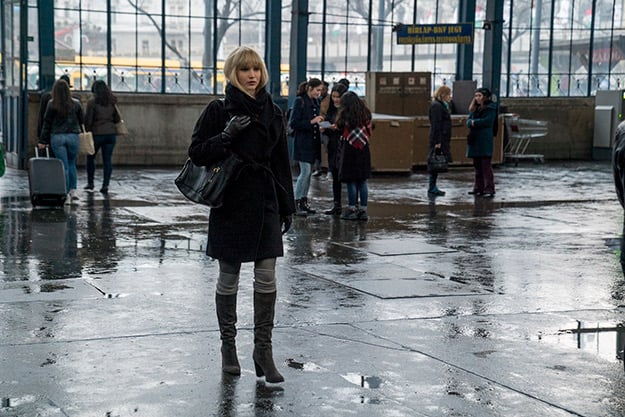Deep Focus: Red Sparrow

In the first half hour of Red Sparrow, Dominika (Jennifer Lawrence), a one-time Bolshoi prima ballerina, clubs a nude couple so fiercely that I assumed she’d sent them into whatever passes for the afterlife among sophisticated post-Soviet culturati. Imagine my shock a scene or two later when Dominika’s dirty uncle, Vanya (definitely no relation to Chekhov’s), a honcho with Russia’s Foreign Intelligence Service, the SVR, looks at her with his typical air of sleazy amusement and says, “You broke her jaw . . . .”
Broke her jaw? I would have thought she shattered every bone in her head. Red Sparrow, based on Jason Matthews’s Edgar Award–winning espionage thriller, runs 2 hours and 20 minutes, but its big problem has nothing to do with the running time. The director, Francis Lawrence, doesn’t seem to know his own strengths, which proves to be almost as great a flaw as having none.
After expertly directing his sur-namesake through the three best Hunger Games films, and giving Suzanne Collins’s YA epic an ideal blend of stylized action and emotion, Lawrence is trying to conjure something entirely different with Red Sparrow. As Dominika becomes an SVR agent tasked with getting the name of a Russian turncoat from CIA man Nate Nash (Joel Edgerton), director Lawrence aims to create a reality-based cloak-and-dagger extravaganza. He fills it with psychological and political suspense, revelations of lurid Russian tradecraft, and locations that range from oligarchic glitz to the arctic chill of the SVR’s State School Four, or, as Dominika calls it, “whore school.” The movie’s view of Russia duplicates Nash’s remarks in the book: “Corruption, repression, imprisonment. Soviet behavior is the default, it’s strangling democracy in Russia.”

Lawrence has been a superb director for Jennifer, and their chemistry hasn’t gone flat. She says “whore school” with a disdain that’s both touching and darkly funny. At one point in the book, Dominika tries “not to sound like Garbo,” but in the film Jennifer sometimes does, to sublime and hilarious effect. She gives a simple phrase like “I don’t care” the world-weariness of a person twice her age. Jennifer masters Dominika’s detachment from her body, which she uses as a tool. She also pulls off a strategy of playing hide and seek with her own deep motivations. Her performance keeps the movie absorbing and alive.
But Francis Lawrence doesn’t come down from the hyperbolic universe of The Hunger Games—he doesn’t succeed at simulating life on a semi-normal scale from a quasi-naturalistic perspective. In Red Sparrow, he applies the same degree of theatrical flair to every aspect of Justin Haythe’s script. We tire of the roar of the greasepaint.
In the first sequence, Lawrence’s showmanship is fun. He goes all Red Shoes when he introduces Dominika as Russia’s terpsichorean pride, then intercuts her Bolshoi opening night with a nocturnal meeting between Nash and his high-risk mole. Lawrence and his usual creative team exult in visual parallels that signal their intertwined fates. Cinematographer Jo Willems brings a tunnel-like shape to the action on the scarlet stage and in a grey-white park, focusing our attention on the approach of Dominika’s partner and Nash’s asset. Editor Alan Edward Bell cunningly builds the crescendo of the dance and the tension of the espionage to jolting points of catastrophe. But when Lawrence applies his craft to material that’s already super-charged—including that first beating, which takes place in a foggy sauna, and other scenes of graphic murder or torture—the result is bludgeoning, no matter how exquisite the lighting, camerawork, and mise en scène.

Whore school is where Dominika goes after Uncle Vanya delivers an ultimatum. She can wait to be knocked off for witnessing a covert assassination, or she can give herself body and soul to the Russian Federation. It’s not too tough a decision. The state already owned her as a dancer, coddling her until she suffered a career-ending injury. As a “sparrow” she retains top medical treatment for her ailing mother (Joely Richardson) and keeps their spacious Moscow apartment.
Quality of life, of course, is just another bourgeois concept to the Matron (Charlotte Rampling), who teaches her students to use their minds to analyze human targets as puzzles and their brawn and beauty to provide the missing pieces. She overcomes any vestige of “sentimental morality” by subjecting them to a nonstop diet of pornography and psychodrama. She designs her syllabus to kill any romantic illusion that they can heal their souls via the way of the flesh. Before Dominika goes to State School Four, her mother tells her to “hold something back” and refuse to give her uncle and his crowd “everything.” Is that how she’ll outwit the Matron and all the other authorities? Is that how she’ll survive?
These questions resonate when she heads off to Budapest with the assignment to ensnare Nash. And they do give the movie a durable spine. Lawrence plays Dominika so shrewdly that we can’t be sure how deeply she falls in love with Nash—and how completely she rebels against the venality, pettiness, and tyranny of the Russian state. We do know she resists the notion that her country has the ability to weaponize every relationship in her life so that her mother becomes (in effect) a hostage and her one chance at true love, with Nash, becomes impossible.

By homing in on her character, the filmmakers stay true to her part of the book, but they cut away too much of what gives this kind of entertainment its charm and variety. They don’t carve out a place for the novel’s depiction of super-skilled septuagenarian surveillance experts who hover over Nash like fairy godparents. They don’t leave room for us to savor the feints and thrusts of two smart operatives like Dom and Nash playing and falling for each other at the same time. (The director’s greatest failure is that their brief flirtation is delightful but their lovemaking feels perfunctory.)
It’s understandable that the film would excise Dominika’s synesthesia. In the book she’s able to read a person’s character as a color in an aura, so Nate’s purple glow means he’s “warm, honest, and safe.” It’s a tricky, garish concept that could have swallowed the movie whole. But without that bit of real-life magic, the film relies too much on excessive force.
The first-rate cast provides some compensation. Jeremy Irons emits an ominous gleam as an SVR general while Sakina Jaffrey and Bill Camp imbue Nate’s CIA colleagues with a respectively sympathetic and ornery professionalism. I enjoyed how shamelessly Mary-Louise Parker, as a U.S. Senator’s chief of staff, mugs her way through a drunk scene (she gets the biggest laughs), and Matthias Schoenaerts carries off the role of Uncle Vanya with surprising high style. When he’s with his niece he enters creepy, incestuous tumescent mode. You keep waiting for his Putin-esque head to pop.
Michael Sragow is a contributing editor to Film Comment and writes its Deep Focus column. He is a member of the National Society of Film Critics and the Los Angeles Film Critics Association, and a programmer at the Criterion Collection.







